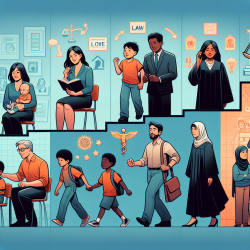Introduction
As practitioners dedicated to improving the lives of children, understanding the unique challenges faced by migrant children is crucial. The study "Migrant children in transit: health profile and social needs of unaccompanied and accompanied children visiting the MSF clinic in Belgrade, Serbia" offers valuable insights into the health and social needs of this vulnerable population. By examining the findings, practitioners can enhance their skills and adapt their services to better meet these needs.
Key Findings from the Study
The study conducted at the Médecins Sans Frontières (MSF) clinic in Belgrade, Serbia, focused on unaccompanied migrant children (UMC) and accompanied migrant children (AMC) who received medical, mental, and social care from January 2018 to January 2019. Here are some of the key findings:
- There were 3,869 children who received medical care, with 1,718 being UMC and 2,151 AMC.
- Skin conditions were the most prevalent among both UMC (62%) and AMC (51%).
- Among mental health consultations, anxiety was a common symptom, affecting 22% of UMC and 24% of AMC.
- UMC had significant social needs, with 83% requiring accommodation assistance and 75% needing essential items like food.
Implications for Practitioners
Understanding these findings can help practitioners tailor their approaches to better support migrant children. Here are some strategies practitioners can implement:
- Holistic Health Assessment: Conduct comprehensive assessments that consider physical, mental, and social needs.
- Flexible Service Delivery: Adapt services to be more accessible and flexible, considering the transient nature of migrant children's lives.
- Collaboration with Social Services: Work closely with social services to address accommodation, legal, and administrative needs.
- Training and Workforce Development: Invest in training a qualified workforce to handle the complex needs of migrant children effectively.
Encouraging Further Research
While this study provides valuable insights, there is a need for further research to continue improving outcomes for migrant children. Practitioners are encouraged to engage in research that explores:
- The long-term impact of migration on children's health and development.
- Effective interventions for addressing the mental health needs of migrant children.
- Strategies for improving access to social services and legal assistance.
Conclusion
The study highlights the complex needs of unaccompanied and accompanied migrant children and the challenges in meeting these needs. By leveraging the findings and continuing research, practitioners can play a pivotal role in improving the lives of these children.
To read the original research paper, please follow this link: Migrant children in transit: health profile and social needs of unaccompanied and accompanied children visiting the MSF clinic in Belgrade, Serbia.










